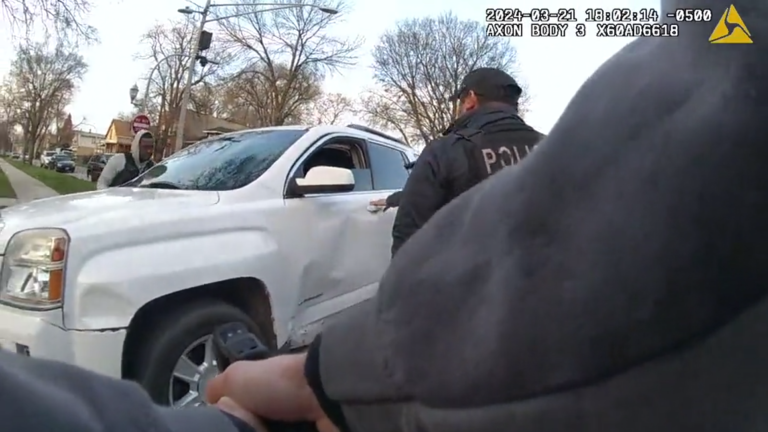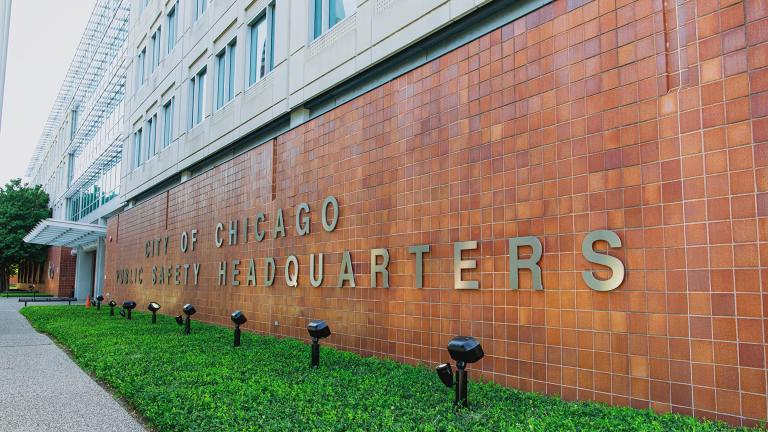Chicago Police Department officials should scrap plans to launch a new system to track Chicagoans they believe to be members of gangs, members of the interim Community Commission for Public Safety and Accountability urged late Wednesday.
Police officials unveiled a new draft of the policy that would govern the new gang database, known as the Criminal Enterprise Information System, or CEIS, on Nov. 7. They said members of the public had until Wednesday to offer feedback on the plans. That draft was no longer available online as of Wednesday evening.
“Outstanding questions remain about the proposed CEIS process and procedures, the purpose and need for it, the circumstances in which this type of information is collected, who can access and use this type of information, and how people will learn that they have been included so that they can contest that decision if they so choose,” according to a statement released by the commission late Wednesday. “Commissioners and community members also have serious questions about whether there are other ways to address law enforcement concerns without causing potentially devastating collateral consequences when an individual is included in a system like the CEIS.”
Representatives of the Chicago Police Department have not announced when the new system will be operational. The mayor's office referred questions to the Chicago Police Department.
"For generations, communities across Chicago – especially marginalized communities – have been adversely impacted by gangs and criminal networks," according to statement released by the department Thursday. "The Criminal Enterprise Information System (CEIS) is a tool designed to help combat this problem, within the scope of fair and constitutional policing. Like our partners with the Commission, CPD remains dedicated to inviting and including community voices as we work together to make our city safer."
During a Nov. 28 meeting of the commission held to review the plans for the new gang database, Chicago Police Department officials said the system would be built on fair and constitutional policing and operate in line with the department’s commitment to constitutional policing.
But that session did not resolve the commission’s objection to the plan to create the new gang database, according to its statement.
“The Commission believes that the current proposal should not be adopted and implemented,” according to the statement.
The dispute over the future of the gang database represents the first clash between the Police Department’s leaders and the commission made up of Chicagoans given the authority to set policy for the department in an attempt to restore trust in its operations.
The Feb. 28 election will determine who will make up councils in each of the city’s 22 police districts, who will in turn nominate seven people to serve on the citywide commission.
The commission will develop “guidelines for all CPD policies related to data collection and will work to strike the appropriate balance between law enforcement and public safety needs and civil rights and civil liberties protections,” according to its statement.
During the commission’s meeting on efforts to remake the way the department tracks gang members, Chicago Police Sgt. Reynaldo Serrato told commission members there were 35,091 people in the former gang database, while the new system lists 1,074 people.
More than three and a half years ago, the city’s watchdog warned the police department’s gang databases were riddled with errors, ripe for abuse and disproportionately targeted Black and Latino Chicagoans.
That April 2019 audit found that the Chicago Police Department listed 134,242 people as gang members. Approximately 95% of those in the databases were Black or Latino.
Former Inspector General Joseph Ferguson determined the city’s gang databases were a “deeply flawed collection of gang data, with poor quality controls and inadequate protections for procedural rights.”
Chicago Police officials at the time immediately agreed to replace the city’s gang databases after Ferguson’s audit was released, which triggered a torrent of criticism that the flawed records put Chicagoans at risk of being deported, denied housing or rejected by employers.
But those efforts stalled after Mayor Lori Lightfoot took office and as the city also faced a class-action lawsuit that demanded changes to the way police officers used the gang database. That lawsuit was settled in November 2020 after city officials agreed to make a series of significant changes to the way the database operates.
As part of the lawsuit’s resolution, the department agreed to publish data about the age, race and reason for inclusion of those listed in the system as belonging to a gang, according to court records.
The department also agreed to publish information about how many people are added to the gang database, how many people appeal that designation and how many of those appeals are granted and denied.
The settlement also prohibited police officers from filling out “gang arrest” cards and submitting that information as justification for adding someone to the database, according to the agreement resolving the lawsuit. Those cards contained unreliable information and were disproportionately used to tag Black and Latino Chicagoans as gang members, according to Ferguson’s audit.
That data will be “walled off,” and no members of the department will be able to access it. If that data is accessed through the department’s Citizens and Law Enforcement Analysis and Reporting, or CLEAR, database, it will be tagged with a disclaimer that any gang membership information had not been verified, according to the lawsuit settlement.
However, Serrato told the commission that officers only stopped adding people to the department’s gang database via arrest cards “two to three months ago.”
Representatives of the Chicago Police Department declined to answer questions from WTTW News about how many people had been added to the database based on gang arrest cards since November 2020, when the lawsuit settlement prohibited their use.
In March 2021, a follow-up audit by Ferguson found the department was still using data from the flawed gang databases. During a July 2021 City Council committee hearing, former Deputy Chief Thomas Mills told alderpeople that police officers need a database that lists individuals’ gang affiliations to prevent “retaliatory violence” and give officers a chance to “get ahead of the next crime.”
Mills is now chief of police in suburban Broadview.
Contact Heather Cherone: @HeatherCherone | (773) 569-1863 | [email protected]








